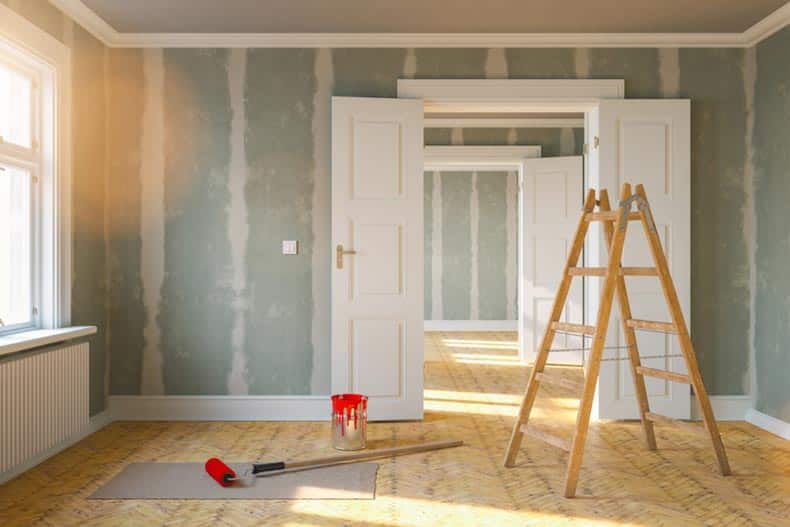Buying a turn-key home is an attractive opportunity for most homebuyers (for pretty obvious reasons). Most homebuyers don’t want to deal with messy construction or the high cost of renovations. Even simple jobs such as painting a house can be more of a headache than some buyers are willing to deal with. And with house flipping at an all-time high, purchasing a renovated home is extremely likely these days.
But with all of the perks to buying a renovated home, there are also some possible downsides—namely, shoddy work. On the surface, a renovated house may have the appearance of being perfectly done, but buyers must do their due diligence to be sure they’re not purchasing a “lemon.” Shady contractors who cut corners or the “do-it-yourself-type” previous homeowner may have used cheap materials or implemented quick fixes to hide existing issues.
When buying a renovated home, it’s important to know how to spot these quick fixes and to be on the lookout for subpar work that may indicate a bigger issue. Here’s what to look out for and what to double-check when purchasing a renovated home.
Quick Fixes to Look Out For:
New Paint

While most renovated homes boast a new paint job, be extra cautious of what that new coat may possibly be hiding. It’s all too easy to cover up mold, rot, smoke stains, and/or water damage by slapping a coat of paint on a wall or ceiling.
Painting over mold does not kill it or stop new mild from growing, so simply painting over mold can put a family at risk for health issues. Even using mold-resistant paint doesn’t kill existing mold, it simply inhibits new mold from growing. Be sure a home inspector checks for mold during the inspection.
Fresh Concrete

While fresh concrete shouldn’t be an immediate red flag, there’s still a possibility that it was used to cover up a foundational issue—a potentially serious and very expensive problem. Be sure to ask the previous homeowner if they’re aware of any foundational issues, as they must disclose that information.
Be wary of cracks in floors or walls, sloping floors, and misaligned doors and windows, all signs that point to foundation issues.
Fresh Wallpaper

Unlike paint, fresh wallpaper can hide cracks in walls, so be cautious if a home has brand-new wallpaper. Cracks in the wall are not only unsightly, but they can signal foundation issues which are a huge problem. Again, be sure to ask the previous owner about foundation issues, and have the home inspector check as well.
New Carpet or Rugs

Newly installed carpet is another common way homeowners spruce up a house, and it’s an attractive feature to potential buyers. But be forewarned that new carpet or new rugs can be a quick coverup for existing issues.
New carpet can hide all sorts of problems, such as foundational issues, cracking, mold, water damage, or termite damage. Take extra care to be aware of any sagging floors, sloping floors, or mildew smells coming from the floors when touring a home.
Extensive Staging/Decorating

Although extensive staging is most likely the result of an overzealous seller, it could also be a “lipstick on a pig” tactic to distract a buyer from problems lurking beneath the home’s shiny veneer. Try to ignore staging and decor when touring a home and focus on the bones of the house—the craftsmanship and layout. Staging a home is a wonderful way to showcase it in its best light and to help a potential buyer imagine living in the home themselves, but be wary of a home that seems “overdressed.”
Converted Rooms

Homeowners who outgrow their homes sometimes convert garages, attics, or basements into additional bedrooms. This plan may work out for them, but it might not be the best use of space for the next homeowner.
Imagine the disappointment of a homeowner searching for a four-bedroom home only to tour a home that really has three bedrooms with a converted garage listed as the fourth bedroom. Many buyers would prefer a true four-bedroom home with an intact garage.
Furthermore, a basement, attic, or garage-converted-bedroom is not built to be a bedroom and may not be insulated well or may lack windows and closets. Additionally, the conversion may not be permitted.
Remodeled Bathrooms

A remodeled, up-to-date bathroom may seem like a dream come true, but be on the lookout for coverups and shoddy work. New paint and/or tile may cover existing black mold, water damage, or mildew.
Be wary of leaks or moisture, and tests all the faucets, showers, and toilets to make sure everything is in working order when inspecting a home. Be on the lookout for wallpaper too, which can coverup mold and cracks.
New or Existing Curtains/Blinds

If a home has its curtains or blinds down during an open house or tour, that can be a red flag. Take a quick peak behind curtains or raise the blinds so that you can better see the condition of a window.
Make sure there aren’t any cracks or condensation forming in between the glass, and try to notice if there are any drafts coming from the window, indicating a poorly fitted window or existing damage. Check around the window frames for any cracks, mold, or damage as well.
How to Protect Yourself From Unpleasant Surprises
Request a Paper Trail

Have your realtor make a request of the previous homeowners to provide paperwork of recent work done, including receipts and warranty information. What an owner must disclose varies from state to state, but federal disclosure laws require disclosure of the existence of lead paint. Beyond that, it varies.
A homeowner may or may not disclose repairs, but it doesn’t hurt to ask. Also, inquire with your realtor to get a clearer picture of the disclosure laws in your specific state.
Check for Permits

Checking to see if any improvements or additions to a home have been built to code, with proper permits, is as easy as doing a little research on the computer or visiting your town or city hall. Permits are public information and can be found online by typing any home address into a site like zimas.org.
You’ll want to check if a property addition or construction was built with a permit to avoid outstanding fees that may be due on the property and to make sure it was built to code. You want to make sure the seller didn’t cut any corners on the construction, leaving you vulnerable or liable.
Another thing to watch out for if a home has work that isn’t permitted is property taxes. Once a home is appraised after the work is done, its property taxes may raise to reflect the new higher value of the home. Ask your realtor to request permit information and do your due diligence by checking for it online or in person.
Hire a Great Property Inspector

A few extra dollars could save you thousands in repairs when it comes to hiring a property inspector. Make sure to research thoroughly to find a property inspector with great reviews who does thorough work and takes pride in his or her job. Not all property inspectors are equal, and you definitely get what you pay for.
Be sure your property inspector checks every inch of the house, from the roof to the basement, to check for water damage, wiring issues, mold, plumbing, termite damage, foundation issues, etc. Request that your property inspector takes color photos to document any issues he or she sees and ask that they create a detailed list of all things inspected, rating the issues from acceptable, to needs repair, to potential hazard.
Research Hazard Zones

Check with your home insurance company or realtor to see whether the home you’re considering purchasing is in a hazard or disaster zone such as flooding, earthquake, tornado, lava, sinkhole, or other natural hazards. If you know what a home may be at risk for, you know what to check for.
If the home is in a flood zone, ask the seller’s agent if the house has flooded before and check for signs of water damage. If the home is in an area prone to sinkholes or earthquakes, check for evidence of foundation issues such as floor sloping or cracks.
Certificate of Occupancy

Make sure the property you’re considering has certification of occupancy. This is a document issued by a local government that declares the home is up to code and is suitable for people to live in it. This document is a one-stop-shop, so to speak, certifying that all new construction or additions have been built with the proper permits.











